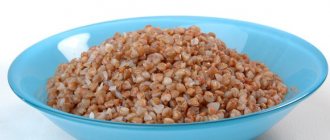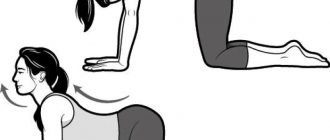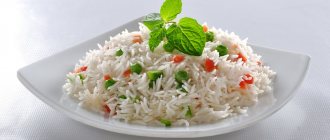Author: Mikhail Ziborov - author of the website makefitness.pro | more details >> I am a swimming coach at a youth sports school and a gym instructor.
Place in the ranking of authors:
17
(become an author) Date: 2020-12-15 Views: 1,560 Rating: 5.0
| All articles by the author >> | Medals articles >> |
Articles are loading...
Everyone knows that food consists of the three most important macronutrients - proteins, fats and carbohydrates (we do not take fiber into account). Each nutrient has its own calorie content: 1 g of protein – 4 kcal; 1 g fat – 9 kcal; 1 g carbohydrates – 4 kcal.
All these nutrients make up the calories you eat in a day. If you eat less than your norm, you lose weight. Eat strictly within your limits – your weight stays stable. More - and you gain weight (muscle or fat - depends on physical activity). And as if from this everything becomes clear: count calories and you will be slim. But “it was smooth on paper, but they forgot about the ravines”! Not so simple.
Calorie content of food
Statement “ If you count calories and eat less than your norm, you will lose weight.”
"Exactly right. You can lose weight on absolutely anything: food from McDonald's, barbecue, sweets, and even alcohol (alcohol has 7 kcal per 1 g)! The main thing is to count calories and fit into your daily norm (preferably 10-15% less than the norm).
In this case, the weight will go away. But the key word here is “weight”! Not just fat, but weight in principle - muscle, water and fat. And if fat does not have any special benefit for us (except for energy), then dehydration of the body is harmful, and muscle loss = worse appearance and little strength.
Therefore, simply calculating your daily caloric intake is only half the battle.
your successful weight loss is, so to speak, 50%.
If you only count calories and fit into your daily norm, but do not get enough protein (to a lesser extent - fat), then you will get an unhealthy appearance (flabby and loose skin, “sugar face”), weakness (loss of muscle mass), possibly – problems with hormones, deterioration of blood vessels (atherosclerosis), etc.
You will lose weight, on the one hand, improve your appearance and health, but on the other hand, make it worse. Therefore, it is important to observe not only calorie content, but also count BJU
.
To find out your calorie intake, use our simple calorie calculator (for women and men separately). There you will also find many recommendations for each of the nutrients.
Why count calories?
Counting calories is one of the most popular ways to monitor your weight. It is used by athletes for whom it is important to strictly keep themselves in shape, people who want to lose weight, and simply those who want to make their diet more balanced and healthy. Here are just a few reasons to try counting calories.
To create scarcity
Proponents of calorie counting are convinced that it does not matter what kind of diet a person uses - kefir, buckwheat or any other. The main thing is that it allows you to create a calorie deficit. When someone who wants to lose weight spends more energy than they receive, the body begins to use up already accumulated fat reserves, which leads to weight loss.
With the abundance and availability of fast food, as well as new habits like daily coffee to go, creating a calorie deficit can only be done intentionally. And to do this they will have to be counted.
On the Internet you can easily find a formula for calculating your daily calorie intake; the most popular is the Harris-Benedict method. After this, you need to reduce the amount received by 10-15% in order to understand how many calories per day you need for a deficit. All you have to do is stick to this figure.
This allows you to lose weight without strict dietary restrictions.
By adhering only to a specific caloric value, you can create the most comfortable and healthy diet. The same calorie intake can include cottage cheese, fruits, meat and vegetables, and dessert with coffee. Their energy value is different, but you can lose weight on both.
This makes it easier to track bad eating habits
You don't have to count calories your whole life. Even temporary practice will help you learn more about the calorie content of certain foods and create the most beneficial combinations of dishes for you. Often we ourselves don’t understand why the weight is growing, because you don’t seem to be overeating. However, calories are hidden in small eating habits. The calorie calculator will help you identify and adjust them.
Proteins, fats and carbohydrates (BJU)
Counting each of these nutrients will be very easy if you use various calculators or applications: they can calculate everything you eat in calories and nutritional value. You can also determine your norm there.
General recommendations for the BJU ratio are 30/15/55, where 30% of your food is protein, 15% fat and 55% carbohydrates. Why is this so?
Protein.
When losing weight, you always need more protein, so such a fair share falls on them. In addition, protein is the nutrient of choice for weight loss due to its thermogenic effect (more calories are lost during digestion than carbohydrates and fats, meaning you will absorb less and therefore eat less).
Fats
. We need fats for the brain, nervous system, hormones and every cell (part of the membranes). You will get some from food. Part from our own subcutaneous reserves. Therefore, only 15% falls on the share of fats.
Carbohydrates
. It's just your energy. Typically, carbohydrates occupy the residual space in food, i.e. First, proteins and fats are calculated, and the remainder goes to the “coals”.
In general, if you want to not only lose weight, but also maintain your health and appearance, then calculating BJU should not only be a priority, but on a par with calculating kcal. This is the second 50% of your successful weight loss.
Some people only practice calculating BJU (without kcal) and lose weight with this. The problem is that in this way it is easy to overdo it with the amount of food and eat too much, i.e. To gain weight.
Calories and protein
Many studies have compared diets with high and low amounts of protein. People who eat a lot of protein lose weight better with the same caloric intake. They retain more muscle than the low protein group. So even if both groups lost the same amount of weight, people in the high-protein group lost more fat and less muscle.
Protein also controls appetite better than fats and carbohydrates. It takes longer to digest and keeps blood glucose levels stable. By the way, this is precisely the effectiveness of low-carb diets. When a person refuses carbohydrates and limits fats, he has no choice but to fill the missing calories with protein.
Protein is the second most important factor in proper nutrition after calories, even for vegetarians, and it's not discussed these days.
Now the question changes a little: given adequate protein in a meal, is the source of the remaining calories important? We are talking about fats and carbohydrates in all forms.
Research on Strict Calorie Control Diets
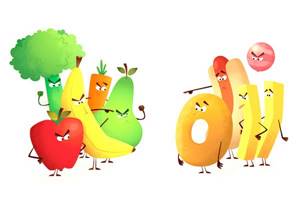
These studies are very expensive and difficult to arrange, so they are in the minority and do not last long. Typically, people are placed in an inpatient setting where calories can be closely monitored. Sometimes they simply give out ready-made meal kits with the required calorie content.
All studies show that under conditions of strict calorie control, you can change the amount of fats and carbohydrates in both directions - this does not affect the rate of weight loss or the quality of the weight lost. You can eat a lot of carbohydrates, or you can eat a little. It's the same with fats.
But there is one caveat: the results may be influenced by the genetics and metabolism of a particular person. This is especially true for carbohydrates and insulin sensitivity. People with poor insulin sensitivity lose less weight on a high-carbohydrate diet for the same calories. But this is not a rule for everyone. This only shows that the diet is not suitable for a particular person.
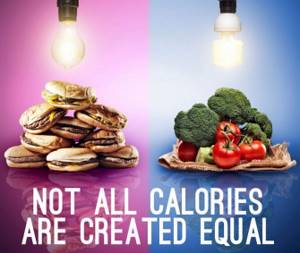
Another thing is misunderstood here. Faster weight loss on a low-carb diet with the same calories occurs due to the body losing water. This has nothing to do with fat, which means it cannot be an argument in favor of the quality of calories.
If the amount of fats and carbohydrates is clear, then what about the source of both? Does the carbohydrate source matter? There are not very many such studies. But those conducted under the same calorie conditions showed that there was no difference in fat loss. They did the same for different fat sources, and again they didn’t find much difference.
With strict calorie control, the source of carbohydrates or fats does not matter either in the rate of weight loss or in the quality of weight lost and body composition.
Studies where calories are not controlled

These studies are particularly good at supporting the "not all calories are created equal" theory, but they can't be used for that.
Some studies are based on recommendations to eat certain amounts of nutrients. For example, reduce fat to 30% of all calories. Or eat no more than 50 grams of carbohydrates per day.
The second studied diets that simply advise people to eat healthy, without outside supervision. The person controls the food independently and then reports. There is little precision in this and such studies cannot be taken seriously. People make mistakes about portion sizes, forget a lot of things, keep silent about others on purpose, and generally greatly underestimate the number of calories they eat per day.
This happens even when a person wears a camera 24/7, which records everything he eats. Even when he knows that he can be checked, he still underestimates his daily calories in the report, and very often - not on purpose. People's self-reports cannot be relied upon.
But all these studies are good because they clearly show the real reason for their effectiveness. For example, in studies with fat restriction to 30% or lower, a person automatically reduces calories and loses weight. Not because of the magical effect of having the right amount of fat and its quality, but because you eat fewer calories in total. It's the same story with recommendations to eat a certain amount of carbohydrates without controlling calories. By cutting carbs, people start eating much less without thinking about it.
Many diets are based on very simple advice: “reduce or eliminate X to lose weight.” X is something that has a lot of calories, usually fatty and sweet. But to explain the effect, these diets and nutritional systems use all kinds of pseudo-physiology, although everything is simple. If food X adds a lot of calories to your diet, remove X. You will eat fewer calories and lose weight. This is not the magic of calorie quality, but simply limiting them.
What is important for losing weight: nutritional supplements or calories?
In short:
- calories are more important to lose weight;
- BJU is more important to maintain health and appearance;
- all together (KBZHU) is important for proper weight loss.
If you pay attention to media experts, then:
- Boris Tsatsouline on his YouTube channel cmtscience advocates calorie counting more, and BZHU - to a lesser extent;
— Alexander Dobromil on his YouTube channels and websites yourfit and makefitness.pro advocates calculating BJU, without denying the importance of calories.
In fact, BJU and kcal are two sides of the same coin! They're both important. Analogy: what is more important in a car – the wheels or the engine? The question is rhetorical. So what is more important for weight loss (for proper weight loss) is both this and that.
Intuitive Eating
Intuitive Eating (IE) focuses on the belief that each of us can eat according to our body's needs without restriction and still stay fit. Dieters will snort contemptuously, but our body is truly a self-regulating system with clearly established signals of hunger and satiety, which we have simply forgotten how to hear.
Intuitive eating is listening to your body and hunger, choosing foods without dividing them into “bad” and “good”, “harmful” and “healthy”. One of the key principles of IP is the legalization of previously forbidden food.
This approach helps to get rid of overeating, provoked by endless attempts to lose weight on a diet, distorted beliefs about food and eating patterns laid down in childhood (for example, when parents teach that the plate must be clean, that food should not be thrown away, that everything must be finished).
When choosing your eating style, look into the future. Can you stick with it for a month? Year? And all your life? Remember that dieting is an uncomfortable state for the body, and discomfort equates to stress. Stress provokes a surge in cortisol, which increases the production of leptin, the hunger hormone.

Cortisol
Which sports nutrition is best for weight loss?
Some people basically don’t have the opportunity to adhere to nutritional rules due to work/study. One of the solutions for such people is sports nutrition. In addition, it can greatly help those who follow a proper nutrition plan (for example, easily and quickly get protein if you are not getting enough from food).
The best cocktails for weight loss can be found here.
Are you looking for workout programs to lose weight at home or in the gym? Then this is the place for you!
Setting a goal is the most important step
Alas, losing weight locally (as well as gaining weight) will not work. Yes, you can say that when you gain weight, fat “accumulates” in the places you hate – someone’s tummy becomes rounder, someone’s thighs become fuller, or cellulite appears more clearly. However, this is primarily due to constitution and heredity, and not to local weight gain.
If, for example, you are not satisfied with a naturally wide waist, then the chances of making it thin with the help of diet are negligible: the fat will go away, but the structure will remain. There is a way out - adjust the proportions by pumping up the buttocks and pelvis, adding muscles in the shoulders, making the waist visually narrower and bringing the silhouette closer to an hourglass figure.
All this brings us to the fact that before you thoughtlessly choose the type of nutrition that suits someone in your circle, it is important for you to decide on your key goals:
- do you want to gain weight or lose weight?
- Why do you want to change the mark on the scale (medical indications, physical discomfort, complexes, social pressure to be overweight)?
- Why do you need to pump up your muscles - to become stronger or just look more prominent?
If you want to lose weight to be beautiful, then this is too vague a goal with very illusory criteria to track. When will you know you are good enough? A vague goal = an equally vague plan and a seemingly unattainable result.
Once you understand what motivates you, you can set clear (and, importantly, adequate) deadlines for implementation. It’s very strange to want to lose 10 kg in 10 days or gain muscle in a month. Fantastically tight deadlines and inflated demands are incompatible: you will inevitably become disappointed and lose motivation, deciding that you “failed again.”
The next step is to answer the questions:
- are you ready to endure restrictions and adhere to discipline;
- is physical activity expected, and if so, what kind and with what frequency;
- Are there any medical contraindications to training and nutrition?
- Are you aware of how the psyche reacts to restrictions and are you aware of the consequences of the nutrition system you have chosen?
Now that we have come to choosing a diet, we can clearly state at least one thing: the previous one did not suit you for some reason, which means you need to change it. What to choose?
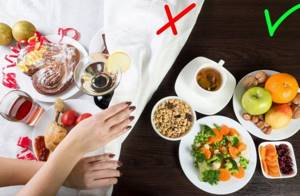
Setting a goal



